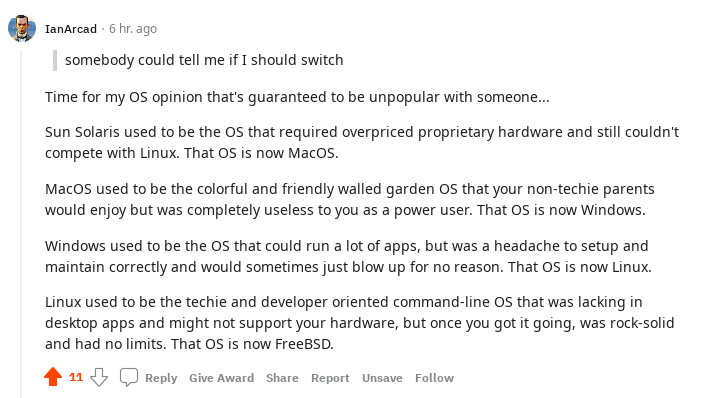Search results for tag #linux
I'm Blake — reintroducing myself as I'm back on the timeline.
I'm a Cloud Engineer working in Site Reliability and DevOps in the healthcare industry. I design and build highly scalable, resilient infrastructure that powers modern healthcare systems. Day-to-day I work with .NET, JavaScript, and TypeScript to deliver reliable platforms.
Outside of work, I build with Go — creating tools that prioritize performance, privacy, and user empowerment.
A couple things I'm working on:
RideAware — A cycling training platform for building structured training plans, analyzing ride data, and completing indoor workouts all in one place.
Arcline Hosting — A self-hosted web hosting service for people who want to know exactly where their data lives. It runs on hardware I own and operate — no AWS, no Cloudflare, no third-party CDN. Shared, WordPress, and VPS plans with personal ticket and email support.
My core interests span SRE, cloud infrastructure, DevOps/automation, and network engineering. I spend a lot of time with Linux, Docker, Kubernetes, Terraform, and enjoy digging into routing, firewalls, and secure network design.
I'm here because I care about privacy, self-hosting, and building things that give people more control over their own data. Good to be back — looking forward to reconnecting with this community.
#reintroduction #CloudEngineering #SRE #DevOps #Go #Golang #Linux #Docker #Kubernetes #Terraform #SelfHosting #HomeLab #Privacy #DataSovereignty #WebHosting #Cycling #HealthcareIT #FOSS #BSD
 boosted
boostedwe are so vulkan v1.2
i am sending this from a laptop which came out 10 years ago (my previous one is from 15 years ago), the specifications are maybe twice as bad so i am using alpine linux and wayland to compensate, it has vulkan and the battery holds a charge though, so it is more of a trade-off than a downgrade
@kzimmermann look i did it, desktop alpine
NEW VIDEO - The Uncomfortable Truth About Windows Server vs. Open Source.
#FreeBSD #Windows #Linux #Opensource #garyhtech
https://youtu.be/JMc1KC7lNJM?si=512atXRIe3yKhua0 via @YouTube
Latest 𝗩𝗮𝗹𝘂𝗮𝗯𝗹𝗲 𝗡𝗲𝘄𝘀 - 𝟮𝟬𝟮𝟲/𝟬𝟯/𝟬𝟮 (Valuable News - 2026/03/02) available.
https://vermaden.wordpress.com/2026/03/02/valuable-news-2026-03-02/
Past releases: https://vermaden.wordpress.com/news/
#verblog #vernews #news #bsd #freebsd #openbsd #netbsd #linux #unix #zfs #opnsense #ghostbsd #solaris #vermadenday
Linux tip: Use “sed -n '100,200p' largefile.txt” to extract a specific line range of a log or text file.
🔗 Learn more in my course: https://monospacementor.com/courses/linsys-1/
Now with a GNOME desktop installed on real hardware.
I have changed the name to avoid implicating Chimera in my experiments/crimes.
Do I know anyone that owns a PinePhone?
Especially for those of you in the US, how has the experience been?
https://pine64.com/product/pinephone-beta-edition-with-convergence-package/
Episode 6 of Dark Blue Weekly released
https://darkblueraven.com/sites/news/dbw-e6.php
#darkblueweekly #darkblueraven #darkblueproject #opensource #freesoftware #linux #bunsenlabs #porteux #linuxcontainers #hyprland
Back in 2022, surrounded by colleagues who were infused with "open source scepticism", I wrote "Open Source in Enterprise Environments - Where Are We Now and What Is Our Way Forward?" https://nxdomain.no/~peter/opensource_enterprise_notes.html as an explainer.
Hopefully a useful thing for others too, with links therein #freesofware #opensource #enterprise #openbsd #freebsd #netbsd #linux
Your OS probably says more about you than you think 😅
What are you running, and why does it suit your way of working or living?
TrueNAS is a NAS-focused open source distribution maintained by iXsystems, a U.S. company. TrueNAS has historically been built on top of FreeBSD, but the migration to Linux has been going on for a while:
https://www.theregister.com/2024/03/18/truenas_abandons_freebsd/
Anecdotes on the Internet seem to indicate the TrueNAS is the most popular NAS distro for the "do it yourself" types.
2/n
Rockstor is an open source NAS distribution based on OpenSUSE Linux. Its developers are based on Portugal and development is community-driven but there is some commercial support available for those who need it. Rockstor feels pretty modern and well-maintained and is not tied to any single company.
5/n
Gaming on Linux sucks because I can't see half of the screen.
(It's not Linux's fault but this chonkers. Game runs perfectly btw in case you're wondering.)
NEW VIDEO - Why Rust Is Causing Tension in the Linux Kernel.
#FreeBSD #Linux #Rust #opensource #garyhtech
https://youtu.be/-XLuGB0wZ1M?si=R3JBRFIYxUgunsMR via @YouTube
Linux tip: Full filesystems crash services and corrupt data. Find resource hogs with “df -h” (filesystem usage) and “du -sh /var/log/*” (large directories).
🔗 Learn more in my course: https://monospacementor.com/courses/linsys-1/
Latest 𝗩𝗮𝗹𝘂𝗮𝗯𝗹𝗲 𝗡𝗲𝘄𝘀 - 𝟮𝟬𝟮𝟲/𝟬𝟮/𝟮𝟯 (Valuable News - 2026/02/23) available.
https://vermaden.wordpress.com/2026/02/23/valuable-news-2026-02-23/
Past releases: https://vermaden.wordpress.com/news/
#verblog #vernews #news #bsd #freebsd #openbsd #netbsd #linux #unix #zfs #opnsense #ghostbsd #solaris #vermadenday
The removal of TrueNAS legacy (CORE) leaves space for a tenth button.
What would you like?
The button need not be FreeBSD-specific. Discussions frequently attract users of other systems.
The sidebar of r/freebsd is crowded (very tall), and this cluster of buttons is relatively far down, so I doubt that it will gain much attention. Still, cafe community thoughts are welcome.
Three screenshots:
1. an overview of <https://www.reddit.com/r/freebsd/top/?sort=top&t=day> before removal of the TrueNAS button
2. the entire sidebar as represented at <https://sh.reddit.com/r/freebsd/about/>
3. focus on the other sub shortlist, and the other shortlist, within the sidebar.
Thanks.
Y'know what? As an #opensource #advocate and #tech enthusiast, it's genuinely awesome to see increased mainstream coverage of #Linux and #FreeBSD. Unfortunately, a lot of these articles are riddled with mistakes, misinformation, clickbait, and overall low quality. A few minutes ago, while catching up on tech news I came across one #ZDNet author's frequent posts on Linux and FreeBSD.
To emphasize my point, I am only going to focus on one article titled, "After decades on Linux, FreeBSD finally gave me a reason to switch operating systems."
The following passages stuck out like sore thumb:
1.) "FreeBSD is more challenging than Linux."
-But is it really? Subjective, particularly if coming from a GUI-driven Linux distribution. Frankly I find FreeBSD easier because of the excellent documentation and coherent design.
2.) "FreeBSD is Unix-like" but further down he states, "Essentially, FreeBSD is Unix, where Linux is based on Unix."
-Contradictory, incorrect, and confusing for newcomers. FreeBSD is Unix. Linux (neither the kernel nor OS) is based on Unix.
3.) "Think of FreeBSD as a more challenging version of Linux. This operating system doesn't hold your hand, so you might learn a thing or two as you install it and the software you require. Even for a seasoned Linux veteran like me, FreeBSD can often be a head-scratcher."
-Challenging because it's *different than Linux*? FreeBSD doesn't hold your hand? What about #Debian, #Gentoo, #Arch, heck even #RHEL? Since the author didn't mention it, I'm going to assume he did not check the FreeBSD Handbook and his "seasoned Linux" experience has been using a Linux desktop for a couple years. Also, head-scratcher?! Being an experienced Debian user, I'd be scratching my head too if I just decided to use Gentoo on a whim. The trauma of hand-configuring the xorg.conf file was real.
Finally, contrary to the article's title, the author ended up not switching to FreeBSD.
-Clickbait.
I am all for more people exploring FreeBSD and Linux. They are great OSes but it is critical the information being reported is both accurate and consistent. For reference the article is linked below.
Episode 5 of Dark Blue Weekly released
https://darkblueraven.com/sites/news/dbw-e5.php
#darkblueweekly #darkblueraven #darkblueproject #opensource #freesoftware #linux #asahilinux #kdeplasma #pipewire #linuxdesktop
 boosted
boostedComparison of cloud storage encryption software
In this blog post, I compare a software that encrypt files on top of public cloud storage
https://dataswamp.org/~solene/2026-02-19-local-encrypted-volume-comparison.html
gemini://perso.pw/blog/articles/local-encrypted-volume-comparison.gmi
#security #privacy #linux
🚨LIVE NOW!🚨 DevOps/SRE Instructor Livestream
On this lovely Thursday, let's chat about #Linux #SystemAdministration, #SelfHosting, or any other topic in the #DevOps and #SRE space you're interested in!
Owncast: https://live.monospacementor.com/
Exosphere:
― aggregated patch and security update reporting
― basic system status across multiple Unix-like hosts via SSH
<https://exosphere.readthedocs.io/> | <https://github.com/mrdaemon/exosphere>
<https://untrusted.website/@mr_daemon/114980024541462116> @mr_daemon
<https://mastodon.social/@terminaltrove/114977286773333343> @terminaltrove
#Unix #Linux #BSD #FreeBSD #OpenBSD #Debian #Ubuntu #RedHat #macOS #Windows #SSH
Static Web Hosting on the Intel N150: FreeBSD, SmartOS, NetBSD, OpenBSD and Linux Compared
Update: This post has been updated to include Docker benchmarks and a comparison of container overhead versus FreeBSD Jails and illumos Zones.
#ITNotes #freebsd #illumos #jail #linux #netbsd #openbsd #ownyourdata #server #smartos #sysadmin #zoneshosting
This Isn't a Battle
After reading a post describing the FreeBSD community as 'toxic', I share a different perspective. This isn't a battle. It's a reflection on coexistence, the original Open Source spirit, and the quiet richness of taking a different path.
https://my-notes.dragas.net/2025/11/14/this-isnt-a-battle/
#MyNotes #IT #SysAdmin #FreeBSD #NetBSD #OpenBSD #Linux #OpenSource
bathing
I use @OpenBSDAms btw
#unix_surrealism #openbsd #vmm #vmd #poster #comic #linux #plan9 #glenda
The Man of MATA pt1
next: https://merveilles.town/@prahou/115271822786360293
pls consider supporting my work: https://analognowhere.com/support
#unix_surrealism #comic #technomage #openbsd #linux #penguin #mata
Codeberg - We stay strong against hate and hatred
https://blog.codeberg.org/we-stay-strong-against-hate-and-hatred.html
Discussions: https://discu.eu/q/https://blog.codeberg.org/we-stay-strong-against-hate-and-hatred.html
UPDATE: I haven't seen Recall in action there. I was just asking the doctor how they'll deal with it.
This morning, I went to the doctor for a scheduled appointment. While she was looking at the results of blood tests from two years ago on the screen (and suggested repeating them for a follow-up), I realized she was using Windows 11. A detail came to mind. The doctor is extremely polite and friendly, so I asked her, "How do you handle the feature called Recall?" The doctor was taken aback and had no idea what I was talking about. I was about to drop the conversation, but she, being a serious professional, immediately called the technicians who manage their PCs to ask for clarification. They downplayed it, saying it's not an issue and that it's a feature "on all PCs, so we can't do anything about it." She started to express that she didn’t like it and wanted it deactivated. No luck: they won’t proceed because, according to them, even deactivating it is "a hack that could compromise future updates." She’s furious and will talk to her colleagues and the decision-makers. She wants secure systems because "there’s patient data involved."
In reality, patient data is stored on servers (which I haven't investigated), but everything that appears on the screen is, in my opinion, at risk.
I’ve offered to help them find a solution—because, if I'm right, all they need is LibreOffice and a browser. In that case, I’ll suggest one of the *BSD or Linux systems and do it for free.
I don’t want to make money off my doctor. I just want patient data to be (sufficiently) secure.
#IT #Recall #Windows #OwnYourData #Security #Privacy #RunBSD #Linux
If you are thinking of moving from Windows to Linux and are not sure where to start, here's the software that I am using day to day:
https://decoded.legal/blog/2024/09/running-a-law-firm-on-free-software-2024-edition/
(Work-focus, as that is where I spend most of my (computing) time, but I am Linux-only for personal computing too.)
And don't forget that many Free software programs have Windows versions too, so you can test before you leap.
Good luck!




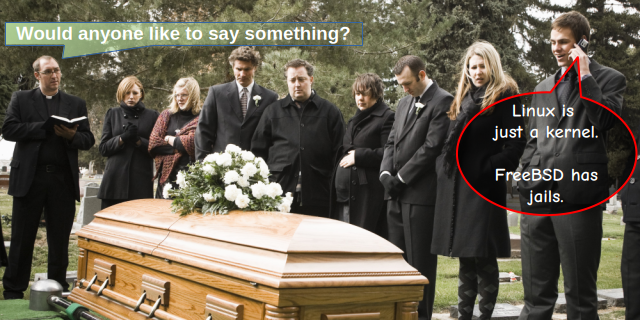
![as per tradition, neofetch of a new linux install. also vkgears to show that this device supports vulkan
full neofetch follows, screen reader users instruct your thing to stop reading here
OS: Alpine Linux v3.23 x86_64
Host: 80MJ (Lenovo ideapad 100-15IBY)
Kernel: Linux 6.18.13-0-lts
Uptime: 44 mins
Packages: 471 (apk)
Shell: bash 5.3.3
Display (LGD0456): 1366x768 in 15", 60 Hz [Built-in]
WM: dwl (Wayland)
Terminal: alacritty 0.16.1
Terminal Font: monospace (11.25pt, Regular)
CPU: Intel(R) Celeron(R) N2840 (2) @ 2.58 GHz
GPU: Intel Atom Processor Z36xxx/Z37xxx Series Graphics & Display ]
Memory: 1.16 GiB / 3.72 GiB (31%)
Swap: 0 B / 4.00 GiB (0%)
Disk (/): 1.95 GiB / 453.15 GiB (0%) - ext4
Local IP (wlan0): 192.168.1.16/24
Battery (PABAS0241231): 49% [Discharging]
Locale: C.UTF-8 as per tradition, neofetch of a new linux install. also vkgears to show that this device supports vulkan
full neofetch follows, screen reader users instruct your thing to stop reading here
OS: Alpine Linux v3.23 x86_64
Host: 80MJ (Lenovo ideapad 100-15IBY)
Kernel: Linux 6.18.13-0-lts
Uptime: 44 mins
Packages: 471 (apk)
Shell: bash 5.3.3
Display (LGD0456): 1366x768 in 15", 60 Hz [Built-in]
WM: dwl (Wayland)
Terminal: alacritty 0.16.1
Terminal Font: monospace (11.25pt, Regular)
CPU: Intel(R) Celeron(R) N2840 (2) @ 2.58 GHz
GPU: Intel Atom Processor Z36xxx/Z37xxx Series Graphics & Display ]
Memory: 1.16 GiB / 3.72 GiB (31%)
Swap: 0 B / 4.00 GiB (0%)
Disk (/): 1.95 GiB / 453.15 GiB (0%) - ext4
Local IP (wlan0): 192.168.1.16/24
Battery (PABAS0241231): 49% [Discharging]
Locale: C.UTF-8](https://media.chitter.xyz/media_attachments/files/116/152/969/218/942/134/original/86570235c80f15af.png)
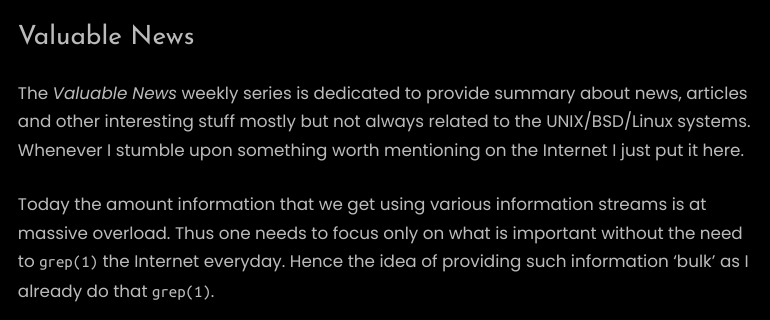

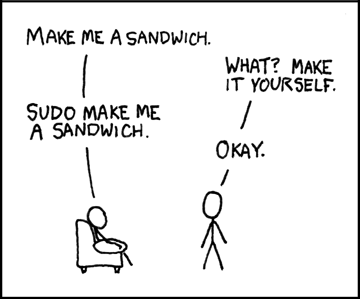

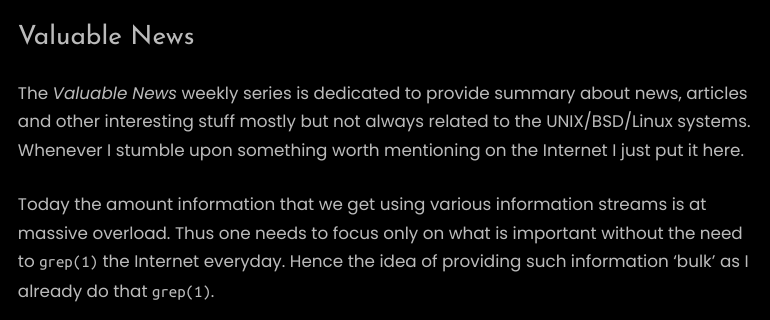


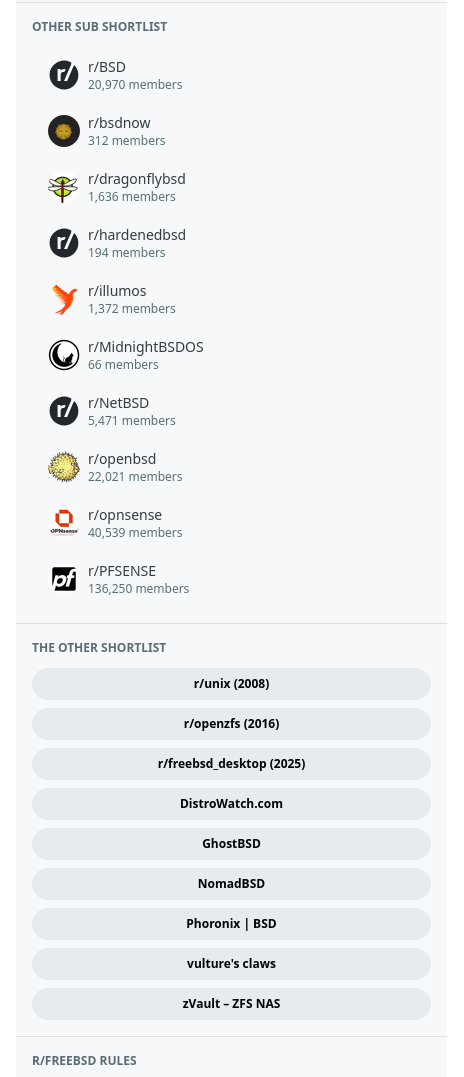

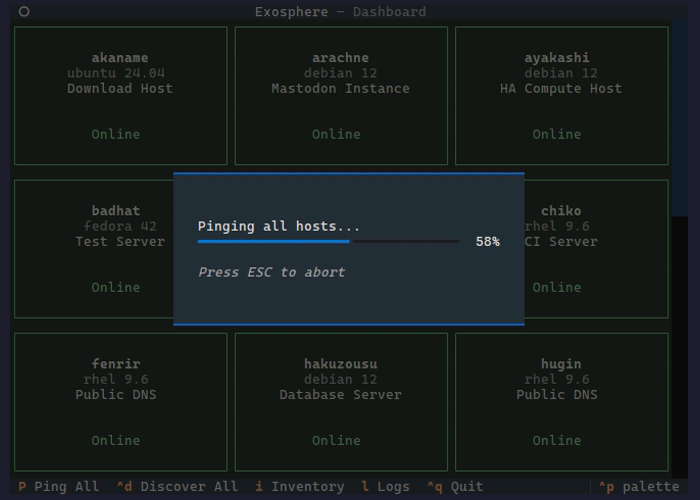








![[?]](https://snac.it-notes.dragas.net/itnotes/s/432eb4dd10c0aaf9a92cf8005b7e2e8c.png)







